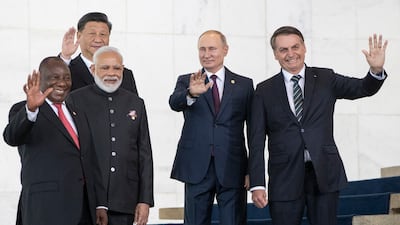As Indian Prime Minister Narendra Modi arrives in South Africa to attend the Brics summit, the focus was on a potential meeting between him and Chinese President Xi Jinping, amid tensions between their two nations over a border dispute.
Brics is an alliance of five emerging economies – Brazil, Russia, India, China and South Africa – countries that comprise 41 per cent of the world’s population and about 25 per cent of global gross domestic product.
The three-day summit, which starts on Tuesday, is the first in-person Brics meeting since 2019.
Mr Modi, Mr Xi, Brazilian President Luiz Inacio Lula da Silva and South African President Cyril Ramaphosa will attend the meeting.
Russian President Vladimir Putin, however, will attend by video link as there is an International Criminal Court arrest warrant against him over the war in Ukraine.
The leaders are expected to discuss co-operation, global developments of concern and improving ties between their diverse economies.
But the focus will remain on leaders of India and China – the two key members of the bloc – who will be sharing the stage about a year after their first high-level meeting at the G20 summit in Bali last year.
The Brics talks hold greater significance for India as it hosts the next G20 summit in September in New Delhi and could help Mr Modi to prepare for further discussions with Mr Xi.

Diplomatic ties between India and China have been frosty since deadly clashes in 2020, when their troops fought in the Himalayan Ladakh region.
Both nations share a nearly 4,000km border that crosses the Himalayas from Ladakh in the north to eastern Arunachal Pradesh, known as the line of actual control, or LAC. The frontier is not demarcated.
There have been several rounds of high-level talks between senior military commanders and foreign ministry officials, the latest being on August 15, but the nations have failed to achieve their objectives.
“Mr Modi shook hands with Mr Xi in Bali and that has not yet been reciprocated in terms of institutional arrangement,” Srikanth Kondapalli, professor in Chinese Studies at Delhi’s Jawaharlal Nehru University, told The National.
"It is hard to see whether there will be any meeting and if there will be any breakthrough.
“Both sides need to talk as the G20 meeting is to be held. Unless there is some breakthrough, shaking hands would be cosmetic.”
Re-establishing ties between India and China will benefit the bloc amid talks of an expansion of the Brics group, experts say.
However, there has been no word from the respective governments on the leaders holding bilateral talks on the sidelines of the summit.
Expansion
Brics was formed as an informal group in 2009 to provide a platform to its members to challenge a world order dominated by the US and its western allies.
The bloc was the formalisation of an idea by London investment banker Roopa Purushothaman in 2001, who coined the term when preparing a report for Goldman Sachs.
With the continuing Ukraine-Russia war, sanctions imposed on Moscow by the West and the shift in the geopolitical order, the potential significance of the bloc has increased, particularly for Russia and China.
More than 40 nations including Iran, Egypt and Ethiopia have expressed an interest in joining.
But the members are divided over an expansion.
Russia and China, which are looking at increasing their influence to counter the US, support a wider membership.
Mr Ramaphosa, too, has backed the expansion, saying “a larger body would represent a diverse group of nations that share a common desire to have a more balanced global order” in an “increasingly complex and fractured” world.
The host nation has also invited 67 leaders across Africa, Latin America, Asia and the Caribbean to discuss the bloc's agenda.
Brazil remains sceptical while India is said to be keeping an open mind.
Experts in India say New Delhi is not opposed to the idea of the expansion, however, it wants the guidelines to be laid out clearly, as the bloc could become geopolitical in China and Russia’s bid to become global powers amid rising tensions with the West.
“India is not against the expansion but it doesn’t want the whole purpose of the bloc to be diluted,” Anil Trigunayat, a former diplomat, told The National.
"China, Russia and South Africa are looking at it from a geostrategic and geopolitical point of view.
“India doesn’t want a China-centric expansion. The grouping was essentially made for emerging driving economies. Will the expansion mean that it would be a geo-economic or geopolitical group?”


